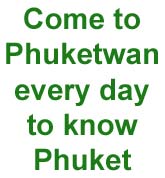Phuket's best photojournalism just got better. Now our photo albums put readers in the picture
SOMETIMES new jobs spring out of unusual events, and that's the case for Jayne MacDougall at Le Meridien Phuket Beach Resort.
She has been Director of Risk Management and Loss Prevention since December 2007. It's an unusual role but one she believes should be established at more resorts.
It's hard to imagine that much could ever go wrong at Le Meridien. The resort has one of Phuket's prime locations, a splendid garden setting around its own cove, and a white-sand beach that is strikingly beautiful.
The spacious 470-room resort is tucked well away from the main road between Patong and Karon. Its official name is Karon Noi, or Relax Bay.
But then in 2004, the tsunami swept in, killing a beach vendor and disabling the resort's electrical system so severely that it was out of action for eight months.
''Security now joins with safety aspects,'' Ms MacDougall told Phuketwan. ''It's all about security of people, property, security in emergency procedures and threat procedure.''
All this does not mean that there are more jobs for security guards. In fact there are now fewer of them.
Instead, the existing staff of 650 have all been trained to become security-conscious.
''With risk management my role expands from health and safety to areas where security joins in with safety aspects,'' she said.
Staff are all involved in different aspects of training and awareness, depending on their role.
''We do a lot of day to day exercises that are in place so that if something does go wrong, we have the information at hand.''
First aid boxes are in the right places, and people are trained how to use them. If a guest faints, they can expect to be treated expertly.
There is a lifeguard system, with guards trained by Australians to gold medallion standards, and an incident system so the resort can respond to an emergency quickly, plus a post-incident reporting procedure.
What generated the change in structure and approach?
''We changed the focus because we wanted to streamline health and safety with security.
''Security nowadays won't be operating in isolation so that nobody knows what they are doing.
''We all work as a team together. We are more concerned with prevention, and that's what risk management is all about.''
Developing policies and procedures that join everything is the key to Ms MacDougall's role.
''This is the first time it has been done,'' she said. ''Generally risk management is something that is more corporate based. We have taken it in to the resort.
''The tsunami shook up this place a lot. We already had health and safety here. Now that we are part of Starwood, we are also more threat-focussed.''
CCTV has been introduced, but not to replace human participation. Security is regarded as everybody's job.
All staff are trained to observe and spot anything that might seem out of place.
''It's a daily task. It's something that we do as an additional part of our jobs.
''When we had the recent blockade at the airport, we were able to handle that very easily and very quickly internally.
''Our senior team is used to meeting together.
''We have our command centre. We got in there, everybody knew what they were supposed to do.
'' It was all managed very easily and very quickly.
''And with very little stress, to be honest.''
An earthquake alert was also handled professionally. ''This is what it's all about, helping us to be better prepared.''
At a less significant level, the resort tries to learn from everything that happens.
''We have a system that updates emergency telephone numbers and emergency contacts for all kinds of equipment.
''Backing up our data off-site . . . many activities that we do every day, just in case.
''Every resort needs to be prepared for anything going wrong. They should not consider the information in their computer is always going to be accessible.
''If something does go wrong, there won't be time then to train their staff.
''They have to already know what to do and how to use the equipment. The drilling and the training are essential.''









